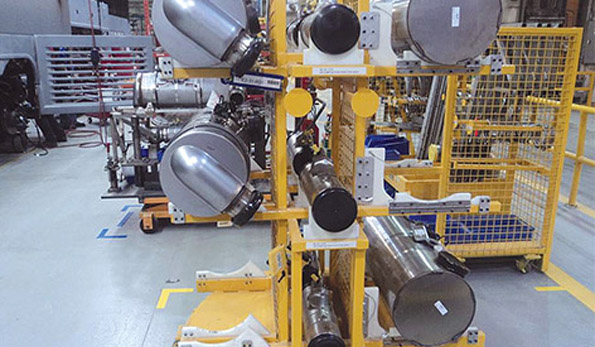
MCI line techs are empowered to contribute and ensure quality work.
Envisioning a day when coaches roll off the production line without a single measurable flaw does not seem like such a stretch for Motor Coach Industries (MCI), Schaumburg, IL. The company has now implemented Quality at Source (QAS), a highly structured lean manufacturing process to help ensure repeatable successes.
This initiative empowers employees at its plants in Winnipeg, MB, Canada, and Pembina, ND, to contribute more proactively to the manufacturing process and measure progress all along the way.
With buzzy acronyms and terminology like process failure modes, effects analysis, training-within-industry, cost scoring, first-time quality, hours per unit, zone offices, control points and audits, QAS isn’t exactly poetry. Nonetheless, it promises plainspoken dedication to organization and procedures that eliminate opportunities for failure, as the system tracks successes as well as lapses.
“It’s a common-sense approach to quality,” says Jim Macdonald, MCI executive director of engineering. “We deliver perfect quality by eliminating failures at every point.”
Science of simplicity
The work at each station is standardized and well defined with all parts and tools for that station delivered beforehand. This process will soon become modus operandi for all MCI production lines in the Winnipeg and Pembina plants.
The pilot for QAS at MCI has been Department N700 in the Winnipeg factory, the site of engine, axle, window and seat assembly and installation on the J4500 coach. McDonald says that since adopting QAS a year ago, N700 has seen remarkable success. This success includes a recent stretch of perfect scores, measured as zero safety incidents, zero flaws and meeting targets on waste, time and costs.
To manage workflow, management has measured the actual time taken to complete normal tasks. Zone offices put representatives from engineering, parts and other key departments alongside manufacturing to help the areas communicate better and to offer expertise as needed.
Multiple control points audit quality, with red and green lights indicating whether the process at each station is under control. A red light always signals the need for immediate corrective action.
While first-time quality is the goal, the Winnipeg management team responsible for QAS has also found the process is shaping a happier and more engaged workforce.
“It’s changing both the way we work and the attitude of the people doing the work,” says Bryan Couch, vice president and general manager of operations. “People want to do good work and this gives them the opportunity.”
Bobby Premsukh, production supervisor of the MCI J-model production line, says empowering workers leads to better quality.
In the implementation of this program, MCI President and CEO Rick Heller brought in QAS expert Eric Walker and appointed David Rowe, vice president, Business Excellence, to lead the transition.
“Since the QAS implementation, we have not experienced a top-five failure mode that would cause a coach-down situation related to N700,” Couch says. “We continue to live up to our Reliability Driven promise. Our policy — to build the most reliable coaches in the industry — is posted throughout our facilities. Our customers are also taking notice, indicated by the orders they are giving us, including Greyhound and many others.”
